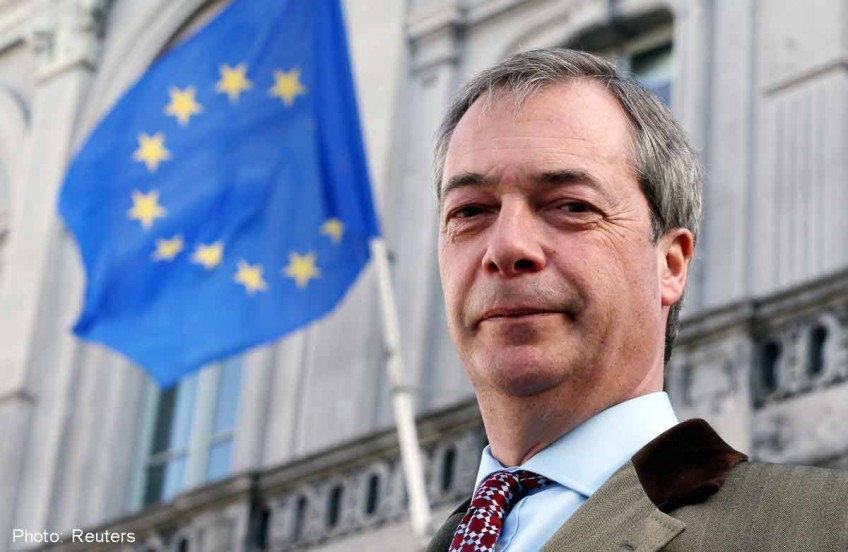Anti-EU leader Farage faces uncertain future in UK vote

LONDON - Nigel Farage has turned the UK Independence Party (UKIP) into a national force but is battling for his future in Thursday's general election, with commentators saying he has run out of steam.
Rarely photographed without a pint of beer, the charismatic 51-year-old has said he will quit the party leadership "within 10 minutes" if he does not win the seat he is contesting.
Farage reminds UKIP's base of older, white, blue collar voters of a bygone era when the economy felt stronger, immigration was lower and Britain was great.
Anti-Brussels and anti-political correctness, Farage, who once compared ex-European Council president Herman Van Rompuy to a "damp rag", led UKIP to top the polls in last year's European Parliament elections.
Once dismissed by Prime Minister David Cameron as a party of "fruitcakes, loonies and closet racists", UKIP is defending two House of Commons seats and looks set to take tens of thousands of votes nationwide from the main parties.
The anti-European Union, anti-mass immigration party is running third in the polls at around 14 per cent.
But while his "people's army" could win a handful of seats nationally, that is unlikely to be enough for Farage to call the shots over a referendum on Britain leaving the EU.
Plain-speaking and populist, Farage was expected to triumph in the televised leaders' debates, but failed to shine, often cutting an isolated figure.
Farage has admitted he struggled at the start of the campaign, saying his health was hit by trying to do too many things.
He survived a plane crash while campaigning in the 2010 election and said he had been suffering back pain as he hit the campaign trail.
"Men are not always very good at looking at their health and I wasn't going to physio and treatment, and now I am, and I'm fine," he told the BBC on Sunday.
'Bloody-minded and difficult'
Farage was born in 1964 to an affluent family in Kent, southeast England. His father was a stockbroker and an alcoholic and his parents divorced when he was five.
He was educated at one of England's top private schools, Dulwich College in London, where he says his headmaster saw him as "bloody-minded and difficult".
Rather than attending university, he followed his father into the City of London, where the former commodities trader says 12-hour boozy lunches were the norm.
Having supported the Conservatives since his school days, he joined UKIP in 1993 as a founder member and was elected to the European Parliament in 1999, aged 35.
Farage became UKIP's leader in 2006 before standing down in 2009 and then being re-elected the following year, when UKIP's ascent really began.
He has survived a string of personal misfortunes -- a serious car accident and testicular cancer, not forgetting the plane crash.
Farage has four children: two boys by his first wife and two girls by his German second wife Kirsten. His interests include cricket and fishing.
Despite his wealthy background, he prides himself on keeping up with the concerns of ordinary people in the "pubs, coffee mornings and yes, even the golf clubs of Britain".
Public face of UKIP
In his pin-striped suit and fedora, Farage is the public, presentable face of a party lacking any other figures with the same profile.
He avoids the kind of race-related gaffes for which UKIP has expelled a string of members but sparked controversy in the leaders' debates by suggesting immigrants with HIV should not receive treatment on the state-funded National Health Service.
UKIP's popularity under Farage played a major part in prompting Cameron to promise a referendum on whether Britain should leave the EU, which would take place by the end of 2017 if he stays in office.
But his political future depends on whether he can persuade voters in the Kent coast constituency of South Thanet to elect him.
Polls show he has a fight on his hands.